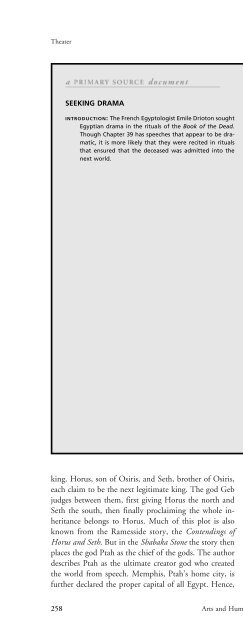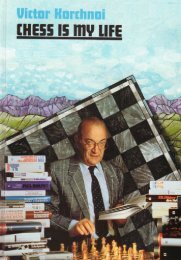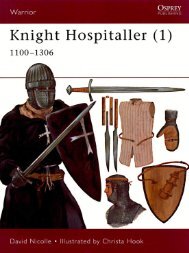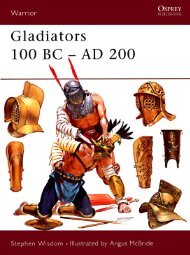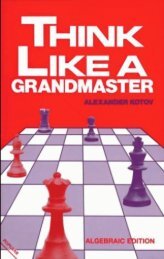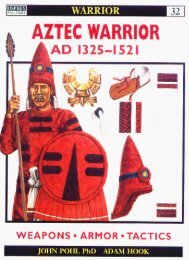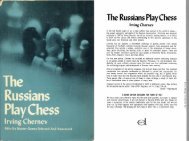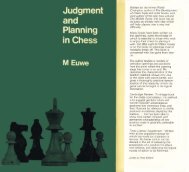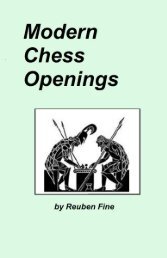- Page 2:
ARTS & HUMANITIESThrough the Eras
- Page 6:
Arts and Humanities Through The Era
- Page 10:
ContentsTOPICS IN FASHIONCloth Prod
- Page 14:
\ABOUT THE BOOKSEEING HISTORY FROM
- Page 18:
\CONTRIBUTORSEdward Bleiberg, Edito
- Page 22:
Era Overviewsculpture. Finally, the
- Page 26:
Era Overviewculture. For that reaso
- Page 30:
Chronology of World EventsEbla, a c
- Page 34:
Chronology of World Eventsthe fourt
- Page 38:
Chronology of World Eventscapital a
- Page 42:
Chronology of World Events668-627 A
- Page 46:
Chronology of World Eventsclass. He
- Page 50:
1chapter oneARCHITECTURE AND DESIGN
- Page 54:
Architecture and Design2008-1938 Ne
- Page 58:
Architecture and Designtwenty-first
- Page 62:
Architecture and DesignNMediterrane
- Page 66:
Architecture and Designtologists la
- Page 70:
Architecture and Designking’s sou
- Page 74:
Architecture and Designlieve that m
- Page 78:
Architecture and DesignThe Step Pyr
- Page 82:
Architecture and Designcompletely u
- Page 86:
Architecture and DesignAerial view
- Page 90:
Architecture and DesignThe Great Py
- Page 94:
Architecture and Designthrough the
- Page 98:
Architecture and DesignPYRAMIDCompl
- Page 102:
Architecture and DesignArcheologist
- Page 106:
Architecture and Designpalace of th
- Page 110:
Architecture and DesignObeliskPedes
- Page 114:
Architecture and DesignA RITUAL SPE
- Page 118:
Architecture and Designtainer holdi
- Page 122:
Architecture and Designpyramid town
- Page 126:
Architecture and Designand probably
- Page 130:
Architecture and DesignHERODOTUS ON
- Page 134:
Architecture and Designprovincial t
- Page 138:
Architecture and Designthat were al
- Page 142:
Architecture and DesignModel of a t
- Page 146:
Architecture and DesignTHEBES AND T
- Page 150:
Architecture and DesignThe columned
- Page 154:
Architecture and DesignModel rocker
- Page 158:
Architecture and DesignA QUARRY INS
- Page 162:
Architecture and DesignA 42-meter l
- Page 166:
Architecture and DesignPLINY’S DE
- Page 170:
Architecture and DesignSOURCESPeter
- Page 174:
2chapter twoDANCEEdward BleibergIMP
- Page 178:
OVERVIEWof DanceDEFINITION. Dance,
- Page 182:
DanceDancers and musicians. Painted
- Page 186:
Dancesleeved cloak sometimes wearin
- Page 190:
DanceA PRINCE SENDS THE KHENER TO A
- Page 194:
Dance(1539-1514 B.C.E.). They also
- Page 198:
DanceTHE LAMENTATIONS OF ISIS ANDNE
- Page 202:
DanceFERRYMEN IN A FUNERAL PROCESSI
- Page 206:
DanceCanopic jars of Neskhons, 21st
- Page 210:
DanceSOURCESEmma Brunner-Traut, Der
- Page 214:
DancePepi II, Thank-you Note to Har
- Page 218:
Kings first wear the Cap Crown, a t
- Page 222:
OVERVIEWof FashionIMPORTANCE OF CLO
- Page 226:
FashionA CARPENTER’S CORRESPONDEN
- Page 230:
Fashionslaughtering a bull wearing
- Page 234:
FashionFragment of a tomb painting
- Page 238:
FashionWOMEN’SWardrobes: Continui
- Page 242:
FashionRelief of hairdresser Inu. B
- Page 246:
FashionSeated goddess in tripartite
- Page 250:
FashionThis king wears a nemes kerc
- Page 254:
FashionQueen Nefertari wearing the
- Page 258:
FashionLate image of Nefertiti. BRO
- Page 262:
FashionPair of corrugated hoops. BR
- Page 266:
Fashionshe wrote to the owner, she
- Page 270:
ture that contrasts earthly reality
- Page 274:
OVERVIEWof LiteratureLONG TRADITION
- Page 278:
LiteraturePtolemeusKleopatraHierogl
- Page 282:
Literaturecursive writing system th
- Page 286:
LiteratureAncient Egyptian scarabs.
- Page 290:
LiteratureIMMORTALITY OF WRITERS: A
- Page 294:
LiteratureCOMBINING LITERARY GENRES
- Page 298:
Literaturethe dialogue. In the Dial
- Page 302:
LiteratureB.C.E.). The good include
- Page 306:
Literaturewhether men were inherent
- Page 310:
LiteratureLooking at the evidence t
- Page 314:
LiteratureHYMN TO THE SUN GODINTROD
- Page 318:
LiteratureHYMN TO THE SUN GOD (cont
- Page 322:
Literaturebiographies, Middle Kingd
- Page 326:
LiteratureDeceased Making an Offeri
- Page 330:
LiteratureUNCERTAIN DOOMINTRODUCTIO
- Page 334:
LiteratureTEACHINGS OF PTAHHOTEP—
- Page 338:
LiteratureBerlin and in the British
- Page 342:
Literaturehe transforms into a bull
- Page 346:
5chapter fiveMUSICEdward BleibergIM
- Page 350:
MusicThe thin lyre gains popularity
- Page 354:
Musicserve the extent of Egyptian c
- Page 358:
MusicAncient Egyptian flutes. © SE
- Page 362:
MusicPLAYINGTutankhamun’s Trumpet
- Page 366:
MusicTwo views of a limestone statu
- Page 370:
MusicTHE STORY BEHIND THE SONGINTRO
- Page 374:
MusicDepictions of Egyptian musicia
- Page 378:
MusicDepiction of musicians at a ba
- Page 382:
MusicSINUHE WELCOMED HOME WITH MUSI
- Page 386:
Musicawait that sacred rite with a
- Page 390:
MusicTwo unnamed princesses playing
- Page 394:
MusicRelief with female musicians.
- Page 398:
MusicHARPIST SONGSINTRODUCTION: The
- Page 402:
MusicAMENEMHAB MAHUSIGNIFICANTPEOPL
- Page 406:
6chapter sixPHILOSOPHYEdward Bleibe
- Page 410:
Philosophywriting of the verb “to
- Page 414:
Philosophyern people still credit t
- Page 418:
PhilosophyAny, the author linked ma
- Page 422:
Philosophyother story. Yet he has i
- Page 426:
PhilosophyBoth the frame and the tr
- Page 430:
Philosophythe text describing his e
- Page 434:
Philosophyartist who created the fa
- Page 438:
Philosophyworld, even before death.
- Page 442:
PhilosophyLarge hawk free-standing,
- Page 446:
Philosophythough such stories are s
- Page 450:
Philosophylaments the social chaos
- Page 454:
2371-2350 In the reign of King Unas
- Page 458:
OVERVIEWof ReligionDEFINITION. The
- Page 462:
Religionperiod papyrus of these tex
- Page 466:
ReligionSIGNIFICANCE OF DEPICTIONS.
- Page 470:
Religionsecond was Baal the storm g
- Page 474:
ReligionAmun. Amun can occasionally
- Page 478:
ReligionDepiction of Osiris, the an
- Page 482:
Religionhis priesthood accordingly.
- Page 486:
ReligionCLEMENT OF ALEXANDRIA ON EG
- Page 490:
Religionibis necropolis at Saqqara,
- Page 494:
ReligionSesebi. Tutankhamun (r. 133
- Page 498:
ReligionTEMPLE COMPLEX. The main el
- Page 502:
Religionor with winged sun disks or
- Page 506: ReligionA barque bearing a statue o
- Page 510: Religionstress the service the tomb
- Page 514: Religioncan hardly be separated.”
- Page 518: Religionhas been a subject of much
- Page 522: Religionbe left plain, or be decora
- Page 526: ReligionHeart scarab amulet of Ptah
- Page 530: ReligionSOURCESSue d’Auria, et al
- Page 534: ReligionDepiction in a tomb of the
- Page 538: Religiontemples to the other gods o
- Page 542: 8chapter eightTHEATEREdward Bleiber
- Page 546: OVERVIEWof TheaterEXISTENCE OF THEA
- Page 550: Theaterwho worked in the late ninet
- Page 554: TheaterDRAMA AND RITUAL IN THE COFF
- Page 562: Theatergan in earnest. These prepar
- Page 566: 9chapter nineVISUAL ARTSEdward Blei
- Page 570: Visual Arts1938-1759 Artists of the
- Page 574: Visual Artsalways posed with a fore
- Page 578: Visual ArtsRe. The yellow associate
- Page 582: Visual ArtsBIRDSin Coffin Text 62Ma
- Page 586: Visual Artstery was made during the
- Page 590: Visual ArtsBack of the Narmer Palet
- Page 594: Visual ArtsSEATED KING. Two limesto
- Page 598: Visual ArtsStatuette of a male deit
- Page 602: Visual ArtsStatue of Khafre, wearin
- Page 606:
Visual ArtsStatuette of Queen Ankhn
- Page 610:
Visual ArtsStanding statue of Ity-s
- Page 614:
Visual ArtsRelief of Akhety-hotep.
- Page 618:
Visual Artsof his eye. His shoulder
- Page 622:
Visual ArtsHead from a female sphin
- Page 626:
Visual Artsnamed, though he is only
- Page 630:
Visual ArtsKneeling statue of Senen
- Page 634:
Visual Artssion at least 25 statues
- Page 638:
Visual Artsline that parallels her
- Page 642:
Visual ArtsThe Wilbour Plaque. BROO
- Page 646:
Visual ArtsStela of Akhenaten (left
- Page 650:
Visual ArtsIn the later Eighteenth
- Page 654:
Visual ArtsTUTANKHAMUN’STombThe E
- Page 658:
Visual ArtsSAITE PERIOD. The Twenty
- Page 662:
\GLOSSARYAbacus: Square, flat upper
- Page 666:
GlossaryMemphis: City in Lower (nor
- Page 670:
\FURTHER REFERENCESGENERALRoger Bag
- Page 674:
Further ReferencesB. M. Carter, “
- Page 678:
Further ReferencesCurt Sachs, The R
- Page 682:
\MEDIA AND ONLINE SOURCESGENERALThe
- Page 686:
\A CKNOWLEDGMENTSThe editors wish t


